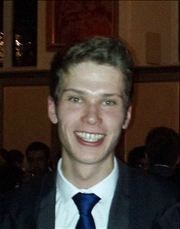Tutor HuntResources Maths Resources
Can A Computer Do Mathematics As Intuitively As A Human
On the subject of artificial intelligence, theorem proving, machine learning and discovery in Mathematics.
Date : 08/03/2015
Author Information

Uploaded by : Richard
Uploaded on : 08/03/2015
Subject : Maths
Introduction
In this project I will be researching the problem of getting a computer to perform tasks which a human mathematician could do. This work will include my own attempt at an algebra solving program and hence researching in great depth a large portion of the whole issue.
We all know computers are good at numerical computation: they can add, subtract, multiply, divide, exponentiate, take logarithms and perform a great array of other functions through algorithms and basic hardware functionality. However their instruction set doesn't usually come close to being able to solve x2+8x+15=0 or find the maximum point of the curve y=-x2+2x-8 and where it intersects some circle. A computer isn't made with the ability to write an inductive proof that there are infinite prime numbers or imagine how to show that n=1 or n=2 if an=bn+cn. Does this take a high level of awareness and knowledge only humans have, or can computers compete?
The concept of a computer system performing more human tasks is the domain of artificial intelligence (AI). AI systems can do complex decision making and in many cases learn, the best can imagine new ideas with little assistance.
I intend to try my best to explore the complexities and practicalities of making a computer program which can solve algebraic problems. I think it is important to do this in order to appreciate both the differences between humans and computers in solving mathematical problems, and the difficulties in artificial intelligence. I will research existing solutions that perform algebraic operations, learn, and make proofs, it would be very interesting to find out that I have produced something new to the world.
The title will be the first discussion topic; the words computer, intuitively, and human demand that I speak about the philosophies of computers 'thinking'; to this there are many scientific and religious arguments. I will define the current cognitive difference between humans and computers, and discuss how small the difference can be made.
...
Conclusion
Whether a computer that does mathematics as intuitively as a human would need to be a neural network or von Neumann architecture is irrelevant, all that matters is that one of these methods works. The functionalism argument, I believe means that a computer can be intelligent or this can be accurately simulated; my question only seems to require the latter -weak AI- and consciousness is potentially unnecessary. I think that as I have shown in my form matching algorithms in particular the instinct side of 'intuition' can be modelled through searching functions and no doubt semi-supervised machine learning could greatly aid this.
Judging by the final version of Mr Maths, my opinion is that it was indeed intuitive, its actions were almost indistinguishable from a human mathematician's. By design MM was to copy my own thought processes, and within reason this was achieved throughout. Like Daniel Dennett said about Deep Blue, I found that after the point of about 3000 lines of code, with fairly comprehensive abilities MM became far too complex to understand what was happening at run time; not so coincidentally at this point I began to see almost rational output. This impression was at least twice as strong by the end. Interested by this I created a log which counted the number of times the [MMExpression init] function was called, astonishingly just creating an equation is about 50, and solving an equation returned thousands; this further supports the functionalism argument.
In terms of practicality, Mr Maths was a big conceptual challenge and a massive challenge for execution, however I would say it is practical, and certainly far from impossible. I was a single programmer working intermittently for just a few months yet I produced a program which could do symbolic manipulation, solve problems, learn, and apply knowledge. I think that is impressive and relatively quick; more time and effort could produce incredible results.
There were things I had planned and never had time to implement, like the ability to understand calculus so that it could be taught and use a correct roots-of-unity system to define multiple answers.
I would argue existing research programs like MU and AM were designed in a half cumbersome way, they were brilliant at the time, and given hindsight from Lenat's and Furse's research I think a program could be made that does all of the above, with considerable intuition. I don't want to be too specific on the functions I mention, remember that MU had a setup that could easily deal with concepts like shapes and other less algebraic maths.
There may not be a computer in existence now that can work with mathematics of every kind, however a computer could do mathematics as intuitively as a human.
This resource was uploaded by: Richard
